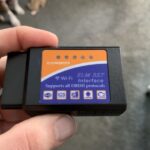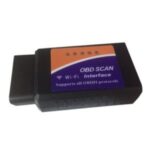Navigating the world of car diagnostics can be confusing, especially when dealing with different generations of onboard diagnostic systems. If you’re wondering whether your shiny new OBD2 scanner can connect to an older vehicle with an “old OBD” system, you’re in the right place. Let’s clarify the compatibility between OBD2 scanners and older diagnostic ports.
To understand this, we first need to differentiate between the diagnostic systems used in vehicles over the years. The terms “old OBD” typically refer to earlier, less standardized diagnostic systems that predate the widespread adoption of OBD-II (On-Board Diagnostics II). These older systems, sometimes referred to as OBD-I or simply “OBD” in a general sense before the standardization, were varied and manufacturer-specific.
OBD-II, on the other hand, is a standardized system mandated in the United States for all cars manufactured from 1996 onwards. This standardization brought about a universal connector type, a set of diagnostic trouble codes (DTCs), and communication protocols, making vehicle diagnostics more accessible and consistent across different makes and models.
So, does an OBD2 scanner connect to these older, pre-OBD-II systems? Generally, the answer is no. OBD2 scanners are specifically designed to communicate with vehicles equipped with the OBD-II system. They rely on the standardized protocols and the 16-pin Diagnostic Link Connector (DLC) that became the hallmark of OBD-II.
Vehicles from the pre-OBD-II era often used different diagnostic connectors, ranging from proprietary connectors specific to each manufacturer to non-standard pin configurations. Furthermore, the communication protocols were not uniform, meaning a scanner designed for one brand might not work with another.
While the terms “OBD” and “OBD2” are sometimes used interchangeably in casual conversation, it’s crucial to recognize the significant differences when it comes to diagnostic tools and compatibility. An OBD2 scanner is engineered to interface with the standardized OBD-II system, which is a far more advanced and unified approach compared to the earlier, fragmented systems.
Attempting to connect an OBD2 scanner directly to an older, non-OBD-II port will likely be unsuccessful and could potentially cause damage due to electrical mismatches or protocol incompatibilities.
If you need to diagnose a vehicle older than 1996, you’ll typically require a scan tool specifically designed for those older, pre-OBD-II systems. These tools often come with a variety of adapters to accommodate the different connector types used in older vehicles and are programmed to understand the manufacturer-specific diagnostic protocols of that era.
In conclusion, while OBD2 scanners are incredibly versatile for diagnosing modern vehicles, they are not directly compatible with “old OBD” systems. Understanding this distinction is key to choosing the right diagnostic tools for your vehicle and avoiding potential compatibility issues. If you’re working on a classic or pre-1996 car, be sure to investigate the specific diagnostic requirements for that vehicle and seek out tools designed to communicate with its particular system.

